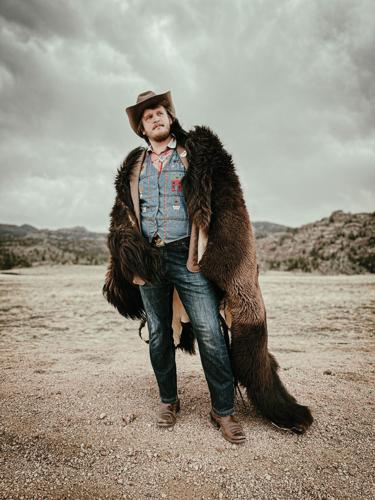
Adeem the Artist
Much of the queer history of country music has involved stating needs — a queer first-love song, a queer cheating song, a queer two-step — and expecting to be punished or ignored. Ever since the Morgan Wallen fiasco in 2021 and his subsequent stratospheric success, mainstream country performers have gone from shutting up and singing to stating violent opinions pretty aggressively — be it Brantley Gilbert’s obsession with the Second Amendment, Jason Aldean’s calling out Maren Morris during his concert amid a move from the far right to something close to fascism, or Aldean’s wife’s transphobic T-shirt line.
At the same time, there was a cluster of songs and albums that carefully and with great variation document queer experiences in working-class Southern spaces. A few prime examples include Adeem the Artist’s “Books & Records,” Willi Carlisle’s “Life on the Fence” and “Tulsa’s Last Magician,” and Justin Hiltner’s “1992,” “Everglades,” “If I Were a Thread in the Yoke of Your Shirt” and “Room at the Table.”

Justin Hiltner
After years of doing lonely archival work, tracing the edges of noncommercial recordings or trying to find well-hidden hints in commercial hits, I welcome this proliferation of complex working-class stories. So many queer stories are told in whispers to other queer people — especially in places like Minneapolis or Orlando or Tulsa. Having the quiet parts said out loud is a mark of the genre’s growth. But these songs know their ancestors. In “1992,” Hiltner sings about how he was born in the same hospital and at the same time as a relative who died of AIDS. In his song “Everglades,” a sexual encounter in the ecologically invaluable swamp is part of a cycle of death and resurrection. At the same time, it is part of a larger act of queer creation that includes “If I Were a Thread,” a song whose official studio recording hasn’t been released, about how Hiltner wants to be the shirt on his lover’s torso. This yearning, haunting, all-consuming ode to another man’s body conveys a lust that I just have not heard in country.
Carlisle’s Peculiar, Missouri might be the best country album of the year. “Tulsa’s Last Magician” is a story of a ramblin’ man — a performer who moves throughout the West, turning tricks in all senses of the word, in Reno or Tampa or Los Angeles. He returns home, he settles in, and the song expands into a space that reflects on the necessity of queer stories. Carlisle’s best-honed skill, one he shares with Hiltner and Adeem, is folding big themes into small narratives. Here, sleight-of-hand magic is a metaphor for tucking queer desire into places that violently preclude it. In “Life on the Fence,” the narrator is in a relationship with a woman and struggles over how to respond to come-ons from a man he had an affair with before — a genre’s rare defense of bisexuality as a rhetorical form.

Willi Carlisle
Adeem, Hiltner and Carlisle talk of working-class queer anxiety. About how we are scared of being found out, we are scared about making rent, we are scared of asking for what we want, we are scared of going to hell, and we are angry at living for the crumbs. On one level, Carlisle’s “I Won’t Be Afraid” focuses on accepting one’s imperfections, and it includes a wry verse: “I will clear the beer cans from the coffee table / I will clean the ashtray on the coffee table / I will do a third thing, I’m sure I’m able / I will say one nice thing before noon / Before 1, before 2.” But it’s also about compassion for the self as a necessary act of defiance. Listening to the song’s maximalist inspirational chorus and its tiny quotidian details, I hear that I wasn’t the only queer person who had ambivalence about the land they grew up in.
Looking specifically at their home in Appalachia, Adeem notes the connections between sexual, cultural and social identity. Cisgender heterosexual men have recorded dozens of songs about hunting as sport in the past decade. Adeem’s song “Middle of a Heart” expands on the metaphor of going hunting for the first time to examine the pride of feeding your family and the heartbreak of failed expectations. On “Books & Records,” they sing about a practice that musicians and writers have been doing for time immemorial — pawning guitars, selling promo copies — to pay for rent or food. After financing the record with a crowdfunding campaign, Adeem signed with Thirty Tigers to release the album, so maybe rent is a little easier now. But as they sing, the pressures don’t diminish: “For the last two years the rent keeps getting higher / And our neighbors all have cars we can’t afford / I’m working two jobs now and, brother, I stay tired / But we could always stand to make a little more.”
Echoing the hope and joy that Hiltner and Carlisle share in their songs, Adeem sings about how maybe someday their characters can buy back the books and records they sold. The song is about the very real nature of economic necessity and how it erodes both the future of artistic expression and the legacy those expressions extend: “Down at Tommy’s Pawn, there’s an unheard song / Buried in my grandpa’s guitar / By a box of antique photos I got when Granny Marie passed on.” Buying back what’s been sold is saying explicitly, aloud and in public, “This is my space too.” It’s equivalent to writing and performing the queerness that Nashville finds inconvenient at best.
We talk with Chapel Hart, discuss the intersection of trans rights and roots music, take a deep dive into data and more










